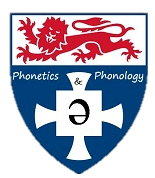-
News:
Accent Articulation Conference First Language Acquisition gamification Group focuses Job Laboratory Phonology Lecturer Linguistics Morphology Perception PhD Funding Phonetics Phonetics and Phonology Phonology Professor Project on Tyneside English Psycholinguistics R Research associate science open day Sociolinguistics Sociophonetics Speech Signal Analysis Speech signal processing statistics Workshop
Tag Archives: Laboratory Phonology
Unraveling the Mysteries of Domain-Initial Strengthening: Insights from Dr. Ricardo Napoleão de Souza’s Latest Research
For this week’s Prosody Interest Group (PIG), we are excited to invite Dr. Ricardo Napoleão de Souza from the University of Edinburgh to talk about his recent research. Focusing on “Domain-Initial Strengthening from an Acoustic Perspective,” Dr. de Souza presented … Continue reading
Posted in Group Focuses
Tagged Accent, Laboratory Phonology, Phonetics, Phonetics and Phonology
Leave a comment
A Resounding Success: Our Journey at ICPHS 2023
From August 7th to 11th, our research group embarked on an illuminating expedition to the 20th International Congress of the Phonetic Sciences (ICPHS) 2023. As one of the most significant congresses in the field of phonetics, the ICPHS is a … Continue reading
PoLaR Workshop with Byron Ahn: A Dive into Prosodic Analysis
On Tuesday, we were delighted to welcome Dr. Byron Ahn for an in-depth workshop on the use of PoLaR in analyzing prosodic features of speech. The three-hour session delved deep into the intricate layers of intonation. The workshop began by … Continue reading
Posted in Workshops
Tagged Accent, Laboratory Phonology, Phonetics and Phonology, Phonology
Leave a comment
LabVanced Workshops and the Lab Tour
We are excited to announce that our linguistics laboratory, which was under refurbishment last year, has been reopened. The Lab has many world-class pieces of equipment. It has two small sound-treated isolation booths and one sizeable sound-proof booth to provide … Continue reading
Job: Research Assistant (Laboratory Manager)
For current researchers in this area at the university you can see the Phonetics & Phonology research groups people page.Posted date: 23-Nov-2021Closing date: 7-Dec-2021 More Information Full job description can be found at here. The Role The School of Education, Communication and … Continue reading
Journal of Phonetics VOT special edition
Off the back of their success in winning the Peter Ladefoged Prize at BAAP 2018, Jalal and Ghada have now had their work on VOT of Arabic stops published in the Journal of Phonetics special edition ‘Marking 50 Years of … Continue reading
Phonetics and Phonology on tour… #BAAP2018
On 12-14th April 2018 a number of us from the Phonetics and Phonology Research Group went to the BAAP 2018 Colloquium at the University of Kent. We had 5 posters (Dan, Wael, Hajar, Hana, Nief) and 3 talks (Jalal & … Continue reading
Posted in Conferences
Tagged Conference, Laboratory Phonology, Phonetics, Phonology, Sociolinguistics
Leave a comment

